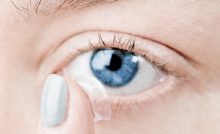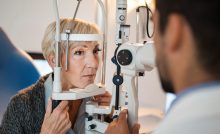Q and A: All About Bi-Focal Contact Lenses
Aging can cause many changes within your body, including some concerning your eyesight. Most of the time, you may experience the effects of these age-related ocular irregularities as soon as you turn 40 years old. These may cause light-focusing problems and refractive errors, such as presbyopia.
Vienna Eyecare Center offers bi-focal contact lenses as a corrective method for this condition. To help you understand how they work, your trusted eye doctor in Reston, VA, answers the most common questions about them.
What are Bi-focal Contact Lenses?
They contain two prescriptions, one for near vision and one for distant vision, in the same lens. They may come in either rigid or soft gas-permeable lens materials.
What are Their Types?
They have two general designs: translating and simultaneous. Also known as segmented or alternating, the first type has a similar mechanism with bifocal eyeglasses in McLean, VA. The upper portion of the lens contains power for distant vision. You can use the lower part for near vision.
On the other hand, the simultaneous sort has two basic patterns that allow concurrent near and distance viewing. In the concentric design, the center part features either a near or distant vision prescription. Its surrounding rings may have alternate near and distant prescriptions.
Meanwhile, the aspheric design blends a range of near and distant powers throughout the lens area. This mechanism produces a progressive near to distant and vice-versa effect.
What Vision Problems Can They Correct?
Our reliable optometrist in Vienna, VA, primarily recommends bi-focal contact lenses for those who have presbyopia. Studies show that they can also help correct nearsightedness. This type of lenses works well even if you have astigmatism. We may advise wearing a toric lens on your dominant eye, while using a bi-focal lens on the non-dominant eye.
How Often Will I Need to Replace Them?
The frequency of replacement depends on the type of contact lenses you choose. The soft lens type is more prone to tears and protein deposits. As soon as either of these happens, we may advise their replacement. We may also advise their replacement once your prescription changes.
Do They Require Any Special Care?
They require the same care as with other types of contact lenses. We advise proper handwashing before handling your contact lenses. Make sure that you use the contact lens solution that we recommend.
We will help you maintain your eyesight when you turn to us for your eye care needs. Call us at (703) 938-7633 or fill out our online form to schedule your appointment.
Recent Posts
Reasons Contact Lenses Might Not Be Right for You
Contact lenses offer a convenient and almost invisible way to correct vision problems for many…
How to Choose the Best Lenses for Your Vision and Lifestyle
Selecting the right lenses for your glasses is as important as choosing the right frames,…
Can Contacts Protect My Eyes Against UV?
With summer in full swing, many of us head outdoors to soak up the sun,…
Can Children and Young Adults Develop Cataracts?
It's a common misconception that cataracts only affect the elderly. When discussing eye health issues…
How Is Astigmatism Treated?
Astigmatism represents one of the most common vision issues encountered by individuals, marked by an…
Am I Too Old to Switch to Contact Lenses?
As we age, our vision inevitably changes, often leading to the need for corrective lenses.…








